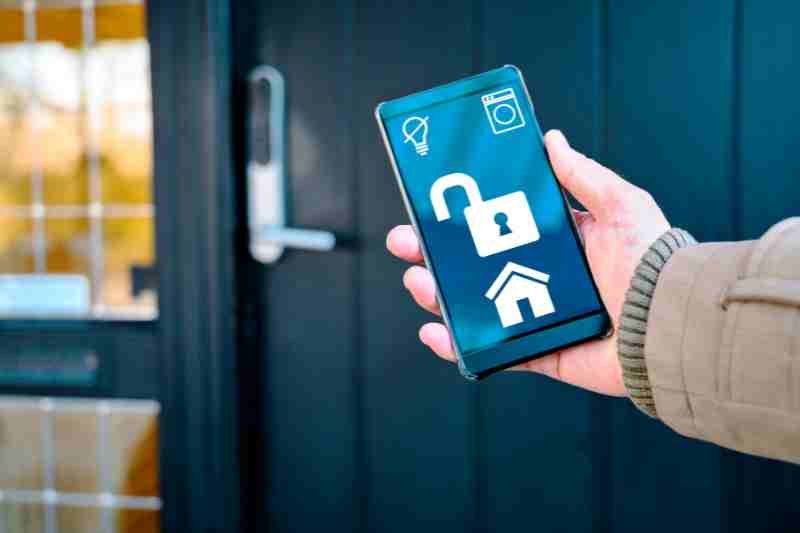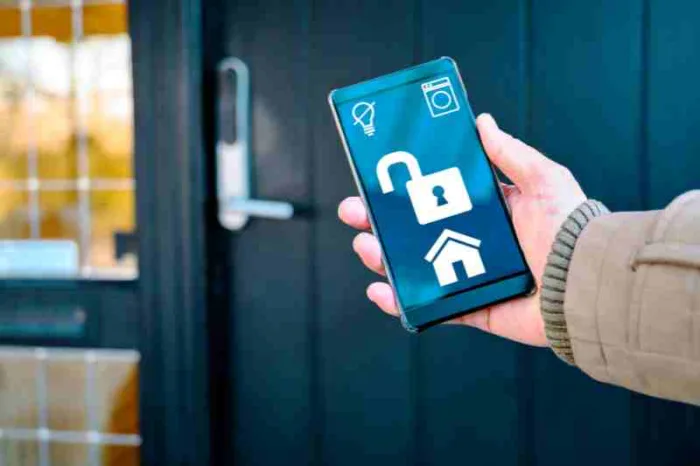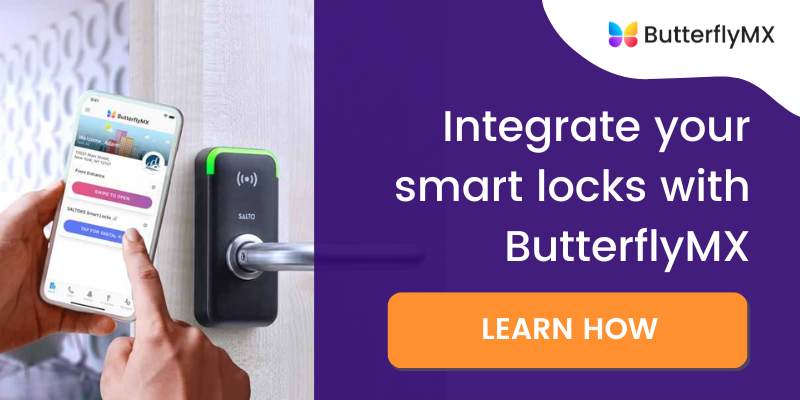Key takeaways
- The six best smart lock systems include the Schlage Encode, Yale Assure Lock 2, SALTO KS, August, Kwikset Halo Touch, and Obsidian smart lock.
- Smart locks are considered safer than traditional locks because they’re designed to withstand commonly used tactics for break-ins, such as lockpicking.
- Before purchasing a smart lock, consider the price, features, type of lock, and the credentials it supports.

Smart lock systems are more than a fancy door gadget — they present a new way of securing properties. But not all smart locks have what your property needs. That’s why we’ve developed a list of the six best smart locks on the market.
In this post, you’ll discover a list of the best smart locks and the benefits of smart lock systems. Then, we describe the best solution to your security management needs — smart lock integration.
This post covers:
- 6 best smart lock systems
- What to know before buying a smart lock
- Integrating your smart lock with other property technology
- Smart lock system FAQs
6 best smart lock systems
There are six smart lock brands that stand out from the others:
- Schlage Encode
- Yale Assure Lock 2
- SALTO KS
- August WiFi smart lock
- Kwikset Halo Touch
- Obsidian smart lock
1. Schlage Encode
Lock type: Deadbolt or doorknob replacement
Connectivity: WiFi
Where to buy:
- $226.69 at Amazon
- $219 at Walmart
Each of Schlage’s smart locks offers a variety of capabilities and functions for both commercial and residential use.
Top features of the Schlage Encode smart lock include:
- PIN system that empowers residents to give temporary entry codes to friends and family.
- App notification alerts whenever a code you provide is used.
- Automatic unlock feature after a customizable amount of time.
- Alarm that sounds whenEncode detects a break-in attempt.
- Schlage mobile app to lock and unlock doors and send lock codes.
Pros:
- Remote control allows for unlocking and locking anywhere you are via the Schlage mobile app.
- Smart lock integrations include Google Home, Alexa, and ButterflyMX.
- Supports up to 100 different PIN codes.
- Available in several different styles and finishes.
- Also available in doorknob or lever models.
Cons:
- More expensive than some other brands.
Read the Schlage Encode review here »
2. Yale Assure Lock 2
Lock type: Deadbolt replacement
Connectivity: Bluetooth, WiFi
Where to buy:
- $188.90 at Amazon
- $179.99 at Walmart
This fingerprint lock from Yale offers ninety-nine percent accuracy. Yale Assure Lock 2 also offers quick and easy installation.
What to expect from Yale Assure Lock 2:
- Fingerprint technology for keyless entry.
- Remote lock and access using a mobile app.
- Offers keyed models, including backup keys.
- Compatible with other smart home technologies.
Pros:
- Supports multiple credentials: mobile app, PIN code, biometric, and physical key.
- Available in key-free and keyed models.
- Hands-free auto-unlock feature.
- Smart lock integrations with Alexa, Google, Apple HomeKit, and ButterflyMX.
Cons:
- Touchscreen may not be intuitive for some.
- Additional connectivity models cost more.
Read the full Yale Assure Lock 2 smart lock review »
3. SALTO KS
Lock type: Mortise
Connectivity: WiFi
Where to buy: Request an offer on Salto’s website.
SALTO KS is a great choice for a wide range of properties, including multifamily buildings and office spaces. Moreover, SALTO’s smart locks can help you simplify access with a catalog of features.
Features of the SALTO KS include:
- Easy installation with concealed screws for a sleeker appearance.
- Resistance-proof with anti-drill finish and protection.
- Simple integration technology that makes it perfect to pair with other systems.
- Comes with additional fobs and credential devices.
- A user-friendly app for residents.
Pros:
- Access commercial spaces with your mobile phone.
- Enables customers to design their locks for their own tastes and needs.
- Suitable for all styles and sizes of door frames, such as fire doors and emergency exits.
- Entirely wire-free.
- Supports key cards and fobs.
- Smart locks integrate with ButterflyMX access control.
Cons:
- Not designed for residential properties.
- No public pricing.
- There is an emphasis on European markets, so if you’re located elsewhere, you may not receive the experience you expect.
Read the SALTO KS review here »
4. August WiFi smart lock
Lock type: Deadbolt modifier
Connectivity: WiFi, Bluetooth
Where to buy:
- $169.99 at Amazon
- $148.97 at Walmart
The August WiFi lock is a popular choice among property managers and renters because it’s easy to install and use. Rather than replacing your existing deadbolt, the August smart lock modifies it so that you can use the mobile app to access the unit and manage credentials remotely.
Features of the August WiFi smart lock include:
- Built-in WiFi so that you won’t need to purchase a separate WiFi bridge.
- Retrofit compatibility makes it easy to install on any existing deadbolt.
- Auto-lock means you can set the door to lock right after it’s closed automatically.
- The August Home app acts as the gateway for controlling your smart lock from your smartphone.
Pros:
- Great for renters who are unable to replace the existing locks.
- Integrates with Alexa, Google, HomeKit, and more.
- Simple and easy to install.
- Retrofits a wide range of deadbolt models.
- Supports your existing keys.
Cons:
- Short battery life.
Read the August WiFi smart lock review here »
5. Kwikset Halo Touch
Lock type: Deadbolt replacement
Connectivity: WiFi
Where to buy:
- $199 at Amazon
Kwikset designs and manufactures WiFi door locks for all types of multi-tenant buildings. They’re simple to use and install, making them a good choice for smaller properties.
Kwikset Halo features include:
- Built-in WiFi, so all you need is a smartphone, a WiFi router, and a smart lock system.
- Three entry modes using a mobile app, a PIN code, or a key.
- Customizable user codes you can assign for one-time use or on a recurring basis.
- Track all lock activity using a view log of activities from the mobile app.
Pros:
- Easy setup that only requires you to connect it to the WiFi.
- Supports biometric fingerprint scan, mobile app, and keys.
- Enable access schedules for family and friends.
- Works alongside Alexa and Google.
Cons:
- Doesn’t work with HomeKit.
- Limited integrations.
Read the Kwikset Halo Touch review here »
6. Obsidian smart lock
Lock type: Deadbolt replacement
Connectivity: Z-Wave
Where to buy:
- $199.59 at Amazon
- $176.49 at Walmart
The Obsidian smart lock from Kwikset offers reliable security with a modern appearance and simple installation.
The Obsidian smart lock includes:
- 30 customized user codes to help manage who can access your property.
- Obsidian Home Connect features an extended range of wireless connections with Z-Wave Plus.
- For property managers, there is an optional master code for more secure control of the device.
Pros:
- Stylish, sleek, and modern design compared to other smart lock options.
- Supports up to 16 different PIN codes and enables mobile access.
- Responsive touchscreen with auto-lock option.
Cons:
- Limited PIN codes.
- Requires an additional Z-Wave hub to manage remotely.
- Does not work with Google Home or HomeKit.
- Does not offer a mobile app.
Read the Obsidian review here »
What to know before buying a smart lock
Before buying a smart lock system for your building, it’s important to factor in everything, such as resident needs and building compatibility.
Other considerations before you buy include:
- Type of lock. There are several types of smart locks, including keypads, key-card enabled, biometric, and keyless door locks. The question is whether one of these will benefit your building the best. For instance, keyless smart locks may eliminate the need to create credentials such as those for key-card-enabled locks.
- Features. Do you want a basic lock that merely grants access to the front door? Or do you want smart door locks that enable remote access, mobile app use, and an online dashboard?
- Price. The overall price of a smart lock will differ depending on the brand and its features and capabilities. You’ll also have to consider that the more features you have, the more extra costs you might incur — including software and installation costs.
- Capabilities. Unlike features, capabilities are the special functions your smart lock will bring to the table. For example, you might want to consider a smart lock that has integration capabilities. With integration abilities, you can use your lock with other property tech, such as access control systems and smart home tech.
Integrating your smart lock with other property technology
While a WiFi smart lock is a great device on its own, integrating this technology with a more widespread access control system will give you even more control of your building’s functions.
Furthermore, a fully integrated system with end-to-end connection will empower residents to go keyless. This is made possible when a WiFi lock is integrated with a video intercom, keypad devices, and other solutions.
For example, ButterflyMX access control products integrate with more than 80 smart locks for doors, including Yale, Schlage, and August. This empowers residents to access the front entrance, amenity spaces, garages, elevators, and even their apartment units from just one 5-star mobile app. Further, they can even reserve amenity spaces for themselves and their guests with the amenity reservation software.
Discover how ButterflyMX works:
Smart lock system FAQs
In this section, we answer the most pressing questions from users about smart lock systems:
- What is a smart lock system?
- Is it worth getting a smart lock?
- Is a smart lock safer than a deadbolt?
- Are smart locks easier to break into?
- Can smart locks be picked?
- Do smart locks work without WiFi?
- Can you still use a key with a smart lock?
- How do smart locks get power?
What is a smart lock system?
A smart lock system is a door lock device that allows owners, property managers, and residents to access their homes without a traditional key.
These systems use a WiFi connection to enable remote access via mobile apps, key fobs, and sometimes keypads.
Is it worth getting a smart lock?
Smart locks offer residents and managers convenience and safety in the form, even more so when integrated with other security systems like video intercoms.
Residents can easily grant entry to their visitors, and property managers can monitor access events in real-time — as well as keep time-stamped audits.
Is a smart lock safer than a deadbolt?
Smart locks are safer than deadbolts because they use encryption and authentication and rely on unique credential systems.
Are smart locks easier to break into?
No. Smart locks are designed to withstand attempts of breaking in and other malicious methods, such as lockpicking and bumping. In many cases, smart locks are built to be tamperproof or resistant, reducing the chances of being broken into.
However, some smart locks are still susceptible to failure under certain circumstances. So, make sure to research thoroughly before investing in smart lock systems.
Can smart locks be picked?
It depends on the smart lock. Many smart locks are designed in a way where picking is impossible, whereas others are much more difficult. Ultimately, whether a lock can be picked or not comes down to the smart lock you choose.
Do smart locks work without WiFi?
Some smart locks can work without WiFi, but their functionality is severely limited. For example, your smart lock won’t unlock or lock remotely without a WiFi connection.
Can you still use a key with a smart lock?
It depends on the smart lock. Many smart lock models support traditional metal keys, but not all. If you want to continue using keys, look for a model that supports them alongside other types of credentials.
How do smart locks get power?
Batteries power most smart locks. These locks often include rechargeable batteries, which need charging every few weeks or months. On the other hand, some use disposable batteries. In some cases, smart locks are wired, but they are less popular because installing them is more difficult.







